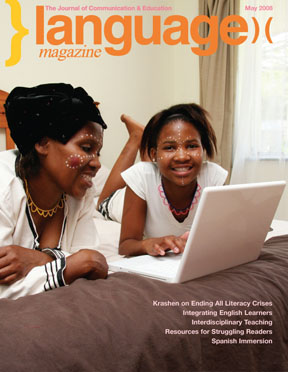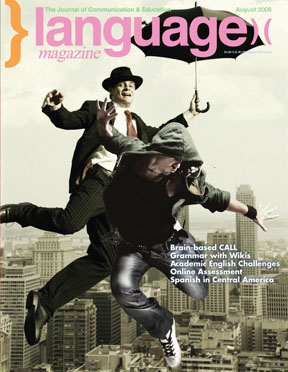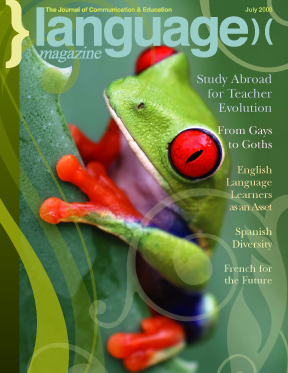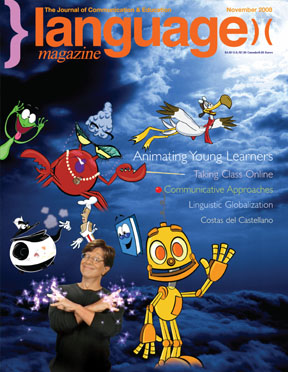White House Initiative on Educational Excellence for Hispanics Announces New Members of the President’s Advisory Commission; Commissioners Hold Their First Meetings at The White House. Click for full story
March 2008
Redrawing the Political Langscape

Now that the Republicans have chosen their Presidential candidate and the Democratic contest is reaching its climax, political analysts across America are searching for demographic indicators to help predict the outcomes of primaries in the key states of Ohio and Texas this month.
Pundits have been quick to claim that supporters can be classified according to race, gender, income and age —Barack Obama gets the Black vote, the affluent White male vote and most of the young (under 30) vote, while Hillary Clinton gets the female vote, the White male blue collar vote, most of the senior vote, and the Latino vote.
With 228 delegates up for grabs, Texas will be pivotal in the race, and Texan Latinos could well decide the nomination, as they are expected to make up a third to a half of the voters casting ballots in the Democratic primary.
Clinton had outpolled Obama two-to-one among Hispanic voters nationwide until Super Tuesday, but Obama did receive more Hispanic support in recent contests in Virginia, Maryland, and the District of Columbia. However, he will have to significantly increase his share of the Hispanic vote if he is to succeed in Texas.
Obama’s surge in popularity coincides perfectly with his adoption of the “Yes, we can” slogan, which even inspired a slew of Hollywood celebrities led by The Black-Eyed Peas’ Will.I.Am to produce a song and video that likens the Illinois Senator to the venerable Martin Luther King, and has taken the inboxes of America by storm.
Maybe now is the time for Obama to recognize the source of this catchy slogan and incorporate the Spanish clarion call, ¡Sí, se puede! into his campaign. Back in the 1970s, César Chávez, a United Farm Workers of America (UFW) co-founder and Mexican American labor leader, embarked on a 25-day fast to protest Arizona’s anti-farmworker labor laws. When supporters began to doubt that the laws could be changed, UFW co-founder Dolores Huerta responded, “Sí, se puede.” Chávez and the UFW adopted the line, which has now become the slogan of America’s vast Latino community.
Tensions between Black and Latino Americans are often exaggerated, which has led many commentators to believe that no candidate can win the support of both communities, but the reality is that they share common political goals. “Our shared experiences as minorities brings us together,” said Congressman Charles Gonzalez, a Texan Democrat who supports Obama. “We know what it’s like to feel the sting of discrimination. The Latino understands that the day that you start citing race or ethnicity or gender for your vote is the day you give a basis for all those who once discriminated against us. It’s not going to happen. Not in our community.”
Obama’s challenge now and in the months ahead is to build cross-cultural alliances and fix the perception of interethnic tension. Can it be done? ¡Sí, se puede!
IN THIS ISSUE:
Squeezing California Schools
Karling Aguilera-Fort believes that California’s Year of Education should be renamed the Year of Increasing Disservice to Language Learners and Other Students
Language Class Students Enjoying Literature
Giovanna Comerio finds a way to incorporate literature into every level of language class
Second Life and Language
Fred Dervin explains how an online community using Web3D has made virtual immersion a possibility for language learners
Sheltering Students from the Deluge
Tina Zmak describes how a challenged school district is improving its results for English Learners using the Sheltered Instruction Observation Protocol Model
Does Gender Matter?
John Gilbert analyzes the evidence behind the theory that girls acquire language skills earlier than boys
Ambos Mundos
Christine Tsai suggests Spanish immersion destinations in Argentina
España
Christine Tsai samples the Old World charm of Spain’s central plain
Last Writes
Richard Lederer on Palindromes
April 2008
Entrepreneurial Educators

As the specter of recession looms large in government accounting offices nationwide, and lawmakers, confronted with the “unexpected” prospect of diminishing tax revenues, are slashing education budgets with abandon, the only real surprise should be that it took so long for the bubble to burst. For several years, economists have warned that growth levels were not sustainable as increases in spending were the result of increased borrowing against property rather than increased incomes. However, our political leaders failed to heed their advice and make provisions for the inevitable downturn and we are now confronted with a crisis situation where tens of thousands of teachers’ jobs are threatened and hundreds of schools face closure.
As usual, some states are better prepared than others, and the states that look set to suffer the most severe cutbacks are those with the highest percentages of minorities and the most English language learners – precisely the children who need the most resources. However, when we look more closely at schools within these states, we see that most schools in more affluent areas are better able to cope with funding cuts. Part of the reason is that such schools receive relatively more state funding, but another important factor is that they raise considerable funding within their communities. Of course, the richer the community, the easier it is to raise funds, but most Americans recognize that all schools need to be funded adequately, not just those which their own children attend.
If our elected representatives cannot be trusted with managing budgets and making provisions for hard times, we can only turn to other sources to make up the shortfall. Businesses, local and not so local, especially large employers in the neighborhood, may be prepared to contribute to the school fund. Insurance companies and banks are also often willing to contribute in return for some promotional exposure.
Of course, educators should be spending their time doing what they do best – teaching, but teachers are naturally good organizers and motivators – exactly what is needed for fundraising.
World language programs in high schools across the nation are also at risk because they are often not compulsory and not subject to standardized testing. But, here again, teachers can campaign for the support of businesses in recognizing the importance of languages, and use their endorsements as ammunition in the fight for program survival. Even if programs are cut, there may be the possibility of using software programs to help students continue with their language studies, or you may be able to set up a low-cost, email, pen pal program so that students can carry on learning through international peer-to-peer networking.
Of course, none of these measures will make up for the cuts in public funding, but our public education system is worth saving, so we must do all we can to help it survive.
IN THIS ISSUE:
Navigating English Learner Standards
John Carr explains how WestEd’s Map of Standards for English Learners not only clarifies California’s standards, but can be used to improve the instruction and assessment of English learners in any classroom setting
Upholding Standards
Dan Domenech argues that formative assessment enables teachers to teach to standards, not just ‘to the test’
Speaking Strategically
Mohammed Arroub demonstrates the benefits of using achievement strategies to increase oral fluency in a second language
Accenting the Positive
Lynda Katz Wilner and Marjorie Feinstein-Whitaker offer simple tips for accent reduction
Crazed on Phonics
Diego Uribe asks if teachers’ input is taken into account when policies on reading education are determined
Capitalizing on China
Christine Tsai scours the districts of China’s capital for Mandarin immersion programs to suit all tastes
The Contrasts of Chile
Christine Tsai marvels at the variety of destination
Last Writes
Richard Lederer on Language Inventors
May 2008
Reading All Formats

Barely a week goes by without the release of a new report highlighting the growth of the literacy crisis in the U.S. At the same time, we are constantly hearing about the achievement gap between white and minority students. And then, there is the dilemma of the digital divide. Of course, all three of these problems are inextricably linked, but their relationship may be more complex than at first glance.
We need to look at our definition of literacy and decide if it is appropriate in a 21st century multicultural society. Our definition of literacy is based on the ability to read and comprehend in English. While it would be beneficial for all of us to be literate in a common language (in addition to our mother tongue, see World Languages, page 16 for the European “personal adoptive language” proposal), and, in the U.S. it would be logical for that language to be English, the reality is that there are hundreds of thousands of people in this country who are literate in their own language but not English. It is not only arrogant, unfair and incorrect to classify someone as illiterate just because they do not understand the language of the majority; it is damaging as it diminishes the importance of their acquired skills and discounts their use as a bridge to English literacy. Research has shown and practice has proven that literacy in one language accelerates literacy in another, especially if both languages have similar roots as in English and Spanish. However, educators are often asked to ignore this advantage and teach students as though they have no literacy skills. This policy of refusing to build upon literacy in other languages must actually slow down the acquisition of English literacy.
The advent of the digital age should also cause us to reevaluate our perception of literacy as the printed page is no longer the sole source of information and means of written communication. Texting, instant messaging and email are now the preferred communication form of affluent youth. In middle-class suburbs, you can hardly walk two minutes down the street without seeing a kid texting— all fingers and thumbs a blur — while in less affluent areas, children are lucky if they have a public library within walking distance.
While it would be wonderful for our children to be reading the classics, or even Nancy Drew, we have to accept that reading habits have changed and will continue to change further. This in itself is not a problem as long as all children have access to these new literacy tools, but the reality of the digital divide is that those children who need them the most – minorities, English language learners — are least likely to have them and least likely to have access to their predecessors — books, magazines and comics.
We need to rethink our literacy strategies to embrace existing skills, work with technology companies to give all children access to modern tools, and adapt to the reality of our multicultural, multilingual, digital society so that the joy and value of reading and writing do not become a privilege but remain a right.
IN THIS ISSUE:
Ending All Literary Crises
Stephen Krashen presents some very good news about children’s literature, some very bad news about access to books, and a solution to end all literacy crises
Connecting to Content
Lori Langer de Ramirez and Geraldine Finazzo present an interdisciplinary model for teaching language, culture and content in the World Language classroom
Matching Styles to Learners
Rita Dunn, Yvonne Pratt-Johnson and Andrea Honigsfeld recommend learning-styles based instructional approaches to integrate English learners in instructional activities while exposing them to necessary academic language and content
Assisting Struggling Readers
Resources to help your students on the road to literacy
Spanish Fashion
Christine Tsai unveils what the chic city of Barcelona and the neighboring ultra-hip Balearic Islands have to offer the stylish Spanish learner
Mexico’s Coast of Culture
Christine Tsai travels to the southern coast of Mexico in search of a Spanish learning experience full of culture
Last Writes
Richard Lederer on Language Inventors
August 2008
Creating Global Classrooms

As fuel prices inflate the cost of travel and concern for the environment increases, the ideal that everyone should have the opportunity to study abroad becomes less attainable. At the same time, such trips and other intercultural experiences are being recognized as an essential part of education in our global economy, so we have to make the most of all opportunities for cultural exchange.
In all probability, study abroad figures will continue to rise despite economic concerns. Also, those students who are unable to physically travel need not forego the benefits of multicultural experience as long as we take advantage of the opportunities available. Technology is opening up the possibility for all students to interact with other students and teachers from all over the world, but schools need the funding to ensure that they have high-speed internet access and that their teachers have the training to make the most of it.
Fortunately, both presumptive presidential nominees Barack Obama (D) and John McCain (R) have made technology a focal point of their education platforms. McCain favors federal funding for virtual schools and online courses as part of a larger focus on school-choice initiatives, while Obama wants universal broadband access and more federal investment into research and education.
According to his campaign website, McCain plans to target $500 million in existing federal funds to build new virtual schools and support the development of online course offerings for students. The plan allots $250 million for states to build virtual math and science academies and another $250 million for digital-passport scholarships, whereby low-income students will be eligible to receive up to $4,000 to enroll in an online course offered by a virtual provider.
Obama’s education advisor has recently stated that the Senator intends to push for broadband internet access in all K-12 classrooms, and, according to his website, he plans to double federal investment in early education and educational research and development by the end of his first term in office.
As long as these campaign commitments are upheld, teachers will have the ability to introduce their students to virtual classrooms and online communities from all over the world. Already many American schools have set up internet-based collaborations with schools in other countries using text, audio and visual links to enable children to practice language skills while making friends. As connectivity improves, there will be opportunities for virtual immersion in world languages and the sharing of cultural experiences on a level which we could not have imagined a generation ago.
Of course, our own multicultural communities also offer opportunities without the need for travel or the internet, and those who are studying abroad will probably consider extending their trips to defray increased travel costs, but we need to make the most of all the opportunities the communication offers us to overcome international boundaries and create truly global classrooms.
..or trilingual” has been met with a barrage of criticism from conservative commentators claiming that he is criticizing Americans who speak only English instead of speakers of other languages who should be learning English.
For example, a Denver-based talk show host on a major station, was appalled by the concept of Americans learning Spanish to help Latino children, and criticized Obama for not supporting a law that would make English the official language of the U.S. Other comments included “English is the language of commerce and should stay that way,” and “As long as I live in America, speaking English is sufficient.”
The point that the presumptive Democrat Presidential Candidate was trying to make was that U.S. students must learn a second or even third language or the country will struggle to compete in the global economy.
“We as a society do a really bad job teaching foreign languages, and it is costing us when it comes to being competitive in a global marketplace,” the Illinois senator said, adding that India has a “huge advantage” because most people speak English besides their native language.
“When it comes to second-language learners, the most important thing is not to get bogged down in ideology, but figure out what works. Understand that my starting principle is, everybody should be bilingual or everybody should be trilingual,” he continued.
Obama has also said that immigrant students must eventually learn English so they can fully assimilate into American society, that he supports transitional bilingual education, and that he is open to teaching in other languages if it is the best way to learn.
He is not saying immigrants do not have to bother learning English because English speakers are going to learn their languages instead, but that “everybody” should learn two or three languages including non-English speakers. Any presidential candidate who disagrees with this position cannot have the long-term interests of his people at heart, because it is plainly obvious that the ability to speak more than one language is becoming more and more valuable as the world shrinks.
English is a very successful language that has grown and adapted to become the world’s only true lingua franca – it does not need the paranoid protection of xenophobes who fear that they will be marginalized by the growth of alternative languages. All of us who have had the humbling experience of being in a situation where we do not understand the language being spoken can appreciate this fear. However, rather than accepting it, as with all fears, we should work to overcome it, and the best way to do that is to learn a new language. Who knows? Some might even enjoy it.
IN THIS ISSUE:
Online Testing
Language Magazine’s guide to choosing the right assessments for your students
Teaching Language for Learning
Jim Cummins offers strategies to help teachers overcome the challenge of academic English
Mind Blocks
Lance Knowles explains how Recursive Hierarchical Recognition, a brain-based theory of language acquisition, is shaping the design of computer-assisted learning materials
Double Wiki Grammar Teaching
Daniela Munca explains how to design task-based instruction for teaching grammar using Wikis
Learning Spanish in Paradise
Christine Tsai goes tropical in her quest for the perfect Spanish immersion experience
Last Writes
Richard Lederer on Our Crazy English Expressions
September 2008
Going for Gold

As the world’s most spectacular sporting event of all time draws to a close, the scale of the Beijing Olympics, and the commitment of its organizers continue to impress.
Five and a half million residents of Beijing can now speak a foreign language, up from just 3.2 million at the end of 2006, according to Liu Yang, the head of the Beijing Speaks Foreign Languages Committee, which was founded eight years ago, and entrusted with the task of “creating a good linguistic environment” for the Olympic games.
By the end of last year, the committee had organized six English language “park celebrations,” 701 “neighborhood study spots” and 433 “English corners” in which local students practiced rote-learned phrases with one another. They staged foreign language song contests, public speaking competitions and free tuition.
The idea, said Liu, was to turn Beijing into the “international city” it was always supposed to be. Although the campaign was spurred on by the Olympic games, efforts would proceed well beyond 2008.
The committee even helped to organize a foreign teacher recruitment drive, although strengthened visa restrictions in the run-up to the games appear to have hampered the initiative.
The Olympics does not create miracles, but it has inspired enthusiasm and investment. The 17-day sporting extravaganza represents the culmination of three decades of Chinese efforts to reconnect with the world, and enthusiasm continues to run high.
Long before the Olympics were awarded to Beijing, learning English was already high on the agenda. The forces that have driven the country to the brink of its biggest international event in history have also driven its people to embrace English, the lingua franca of global culture and commerce. The education system, at least in the cities, has followed the economy. But, interestingly, this program has been targeting average people (cab drivers, waiters, etc.) rather than the business elite.
As schools across this country start another year faced with budget constraints and painful cost-cutting decisions, we can be sure that our English learners will be among the hardest hit by these money-saving measures. California, with the most English language learners, has yet to agree a budget although more than $3 billion (about five percent of the state’s education budget) has been earmarked to help 8th graders improve their algebra, leaving schools full of uncertainty and confused about priorities.
What a stark contrast to the lavish expenditure on the Olympics and the billions of dollars that American companies alone pumped into the event. Of course, this expenditure is intended to produce a return on investment in the form of global brand building or some such marketing objective.
Were that expenditure invested in the education of our most disadvantaged children, would not the return on investment be even greater?
IN THIS ISSUE:
Empowering Teachers with Tools and Training
Malinda Daniel examines the keys to successful implementation of computerized instructional technology in the ESL classroom
Getting Students Onboard
Glenda Demes da Cruz explains how to use the board to have fun while motivating language students
Target Practice
Gail Weinstein and Janet D. Johnson make the case for a learner-centered ESL curriculum putting the principles into practice
Characterizing Chinese
Barry Cunningham strives to become a master of the Mandarin script
Learning in the Land of Oz
Christine Tsai recommends Australia as an inspirational destination for teachers and learners of English
Last Writes
Richard Lederer on Our Crazy English Expressions
June 2008
Multicultural Education is No Luxury

During difficult economic times, there is a general acceptance that education should endure budget cuts like all public services. We are led to believe that the most we can expect from our educational institutions during hard times is basic instruction in the core subjects which will be enough to give today’s students the tools they need to survive. But, the world has changed, and those basic skills are unlikely to be enough for the next generation.
Developments in communications and transport have radically altered work patterns and methods of production, and this process will only accelerate in the near future. Immigration flows will continue to follow the demand for labor which is likely to be more erratic as corporations become more flexible in their reactions to market fluctuations.
The growth of outsourcing is a good example of how the world is changing, but a recent business deal may be even more indicative of what is to come: Ford’s announcement a couple of months ago that it was selling its UK-based Jaguar and Land Rover divisions to Indian car manufacturer Tata would have been unbelievable twenty (maybe even ten) years ago.
Even if this takeover has little effect on the company’s employees at the moment, it is easy to see that our children will need to operate in a multicultural, international environment even if they never leave their own neighborhood.
The ability to speak languages and understand different cultures will be a necessity. Without such skills, the prospect of such a rapidly changing society will only invoke fear.
Luckily, many of our communities are now so culturally diverse that we have the opportunity to integrate multicultural education across the curriculum but this is no substitute for a coherent plan to ensure that our children are better prepared for the society into which they will grow.
It may seem tactless to suggest that now more than ever we should be encouraging students to study abroad and broaden their cultural horizons even as school districts are having to lay off teachers, but, if we truly want to prepare our children to not only survive but succeed in their world, it may be our best option.
In this era of standardized testing, there is little room for maneuver to incorporate multicultural education into existing curricula but even less chance that it will become compulsory, so it is up to individual teachers to do what they can to encourage multicultural understanding so that our next generation has the flexibility to flourish.
IN THIS ISSUE:
Curriculum for the Whole Child
Elia Corona and Jeanette Gonzalez-Quiceno explain how two school districts are using innovative methods to help English learners achieve their potentials
Toward Total Recall
Hall Houston examines techniques to improve memory skills in the language classroom
Zen and the Making of the Multicultural Person
Josette Bonafino suggests that the less tangible benefits of study abroad may be the greatest
Willkommen
Christine Tsai scours the regions of Germany to find the ideal immersion program
Waltzing Lyrically
Christine Tsai samples German programs in Austria
Studying Abroad on a Budget
Cecile Lopategui offers advice for international students faced with a devalued dollar
Last Writes
Richard Lederer on Sporty English Language
July 2008
A Trilingual America

Barack Obama’s recent suggestion that “everybody should be bilingual…or trilingual” has been met with a barrage of criticism from conservative commentators claiming that he is criticizing Americans who speak only English instead of speakers of other languages who should be learning English.
For example, a Denver-based talk show host on a major station, was appalled by the concept of Americans learning Spanish to help Latino children, and criticized Obama for not supporting a law that would make English the official language of the U.S.
Other comments included “English is the language of commerce and should stay that way,” and “As long as I live in America, speaking English is sufficient.”
The point that the presumptive Democrat Presidential Candidate was trying to make was that U.S. students must learn a second or even third language or the country will struggle to compete in the global economy.
“We as a society do a really bad job teaching foreign languages, and it is costing us when it comes to being competitive in a global marketplace,” the Illinois senator said, adding that India has a “huge advantage” because most people speak English besides their native language.
“When it comes to second-language learners, the most important thing is not to get bogged down in ideology, but figure out what works. Understand that my starting principle is, everybody should be bilingual or everybody should be trilingual,” he continued.
Obama has also said that immigrant students must eventually learn English so they can fully assimilate into American society, that he supports transitional bilingual education, and that he is open to teaching in other languages if it is the best way to learn.
He is not saying immigrants do not have to bother learning English because English speakers are going to learn their languages instead, but that “everybody” should learn two or three languages including non-English speakers.
Any presidential candidate who disagrees with this position cannot have the long-term interests of his people at heart, because it is plainly obvious that the ability to speak more than one language is becoming more and more valuable as the world shrinks.
English is a very successful language that has grown and adapted to become the world’s only true lingua franca – it does not need the paranoid protection of xenophobes who fear that they will be marginalized by the growth of alternative languages.
All of us who have had the humbling experience of being in a situation where we do not understand the language being spoken can appreciate this fear. However, rather than accepting it, as with all fears, we should work to overcome it, and the best way to do that is to learn a new language. Who knows? Some might even enjoy it.
IN THIS ISSUE:
English Language Learners as an Asset
Ted Appel and Larry Ferlazzo describe their school’s strategies for maximizing the potential of English learners for the benefit of all students
Study Abroad for Teacher Evolution
Joan A. Rhodes and Tammy M. Milby show how the experience of study abroad can help teachers in their own diverse classrooms
From Gays to Goths
Lori Langer de Ramirez and Albert Martino explain how the application of multicultural understanding extends beyond ethnic and geographic borders
Spain, A Multifaceted Gem
Daniel Ward explains how Spain’s history has shaped it into the fascinatingly diverse country it is today
La Belle France
Christine Tsai falls for all France has to
offer the language learner
French in Belgium
Christine Tsai suggests an interesting
alternative French immersion destination
Last Writes
Richard Lederer on Our Sporty English
Study German at Goethe Institute

The Goethe Institute is the culture institute of the Federal Republic of Germany. As such, it promotes the study of the German language as well as the cultural understanding between Germany and other countries. From visual arts to literature, from television and radio to theater and dance, the Goethe Institute runs the gamut in its promotion of the culture of the homeland of Beethoven, Goethe and Schiller.
The Institute’s three principle objectives are:
- to promote the study of the German language abroad
- to encourage international cultural cooperation
- to convey an all-round image of Germany by providing information on its culture, society and politics
In addition to cultural events for students and teachers, the Goethe institute offers courses and exams — providing German-language certification accepted worldwide. Begin your foray into the language of Weimar and the father of world literature with the Institute bearing his namesake: the Goethe Institute.
http://www.goethe.de/enindex.htm
News
3/15/2012 Fervor to Learn German in Southern Europe
According to several sources, people from Spain, Portugal, and other countries suffering economically in the European Union are flocking to learn German. It is their hope that learning the language will help them find jobs in Europe’s economic stronghold. Germany’s economy grew by three percent last year and recorded its lowest rate of unemployment in almost twenty years.
The Goethe Institute, which promotes and teaches German worldwide, has seen an increase in enrollments at various international teaching centers. Globally, there has been a steady incline, with the number of German language students rising by 7.5 percent. The number of Spaniards taking German at the Goethe Institute rose by 35 percent in 2011. Similarly, in nearby Portugal, the organization saw a 20 percent increase in registration.
Over the last year, more than 36,000 people traveled to Germany to study at the thirteen different centers of the Goethe Institute.
“Indeed, there is a strong trend among younger people from countries hit hard by the dept crisis to come to Germany to learn the German language and seek employment opportunities in Europe’s strongest and most stable economy,” commented Dr. Rainer Epbinder of the Goethe Instiute. “Most of them are coming from Spain which due to that is now the top market No. 1 for the 13 Goethe Institutes in Germany. So one could argue that the crisis in other economic sectors had a very good influence on the German language school market. Apart from that we see a strong increase of language students coming from Russia and Ukraine as well. We expect that boom to go on in 2012.”
November 2008
Greater Expectations

In a recent commentary published online in Education Week (Give Latin [and Potential Dropouts] a Chance, September 22, 2008), Baynard Woods, a public school teacher from Washington DC, explained how his experience convinced him that the teaching of “Latin might play a role in eliminating the achievement gap between disadvantaged and affluent students.”
Woods’ theory is that the prestige and aura of Latin instilled a sense of self-worth in his underprivileged students that they had previously lacked and inspired increased achievement across the curriculum. He also believes that the rigid logic of its grammatical system presented them with easily comprehensible challenges to which required them to think, or as Woods explains “Students were able to see language as a game with rules that could help them think.”
There is a wealth of research supporting the argument that language learning improves academic performance in general, but little research has been undertaken into its effect on self-perception. Although there is a lack of empirical evidence, there can be little doubt that the acquisition of a second language confers upon learners a sense of discovery and empowerment that must boost self esteem.
Despite the evidence in support of second language learning, it is still considered a luxury available only to the middle classes, and not worthy of core subject status. Even English language learners are often actively discouraged from improving their command of their mother tongue in the misguided approach to the acquisition of basic literacy.
The current collapsing of economies around the world like a house of cards and the recognition that national governments need to work in unison for a remedy are painful proof of the global interconnectivity that is now part of our everyday lives. Now, more than ever, we can clearly see that languages will be essential to the success of the next generation. To enable our children’s success, languages must become part of the core curriculum from kindergarten.
We need to raise our expectations of all students and trust them to rise to the challenge of learning a second (or even third) language from an early age. Of course, basic English literacy is necessary but if that is all we expect we will be lucky to achieve it. Only by aiming higher can we transfer respect to children necessary for them to believe in themselves.
As we run up to the presidential election, bear in mind that Senator Obama has stated in countless interviews that he believes that while English Language learners should become fluent in English, he also believes that English-speaking students should be learning a second language by emphasizing foreign languages in schools, while Senator McCain has not voiced his opinion on the subject of language education.
Whoever presides in the White House for the next four years, let’s hope that they have high hopes for all American students and recognize that investment in their education will produce a better return than any stocks, bonds, or commodities.
IN THIS ISSUE:
Animating Young Learners
Jenn Reese describes how a new, animated TV show is inspiring love for languages from an early age
Taking Class Online
Lori Langer de Ramirez explores new Internet technologies revolutionizing the language classroom
Language Rules
Michael Bell argues that globalization of language will muzzle the nation-state
Communication on the Fly
Haydn C. Griffith offers a practical perspective to the communicative approach to language acquisition
Costas del Castellano
Christine Tsai samples the linguistic delights of Spain’s northern and eastern coastal regions
Spanish Immersion with a Shallow Pocket
Language Magazine’s recommended destinations for students on a tight budget
Last Writes
Richard Lederer on Top Dog Presidents


